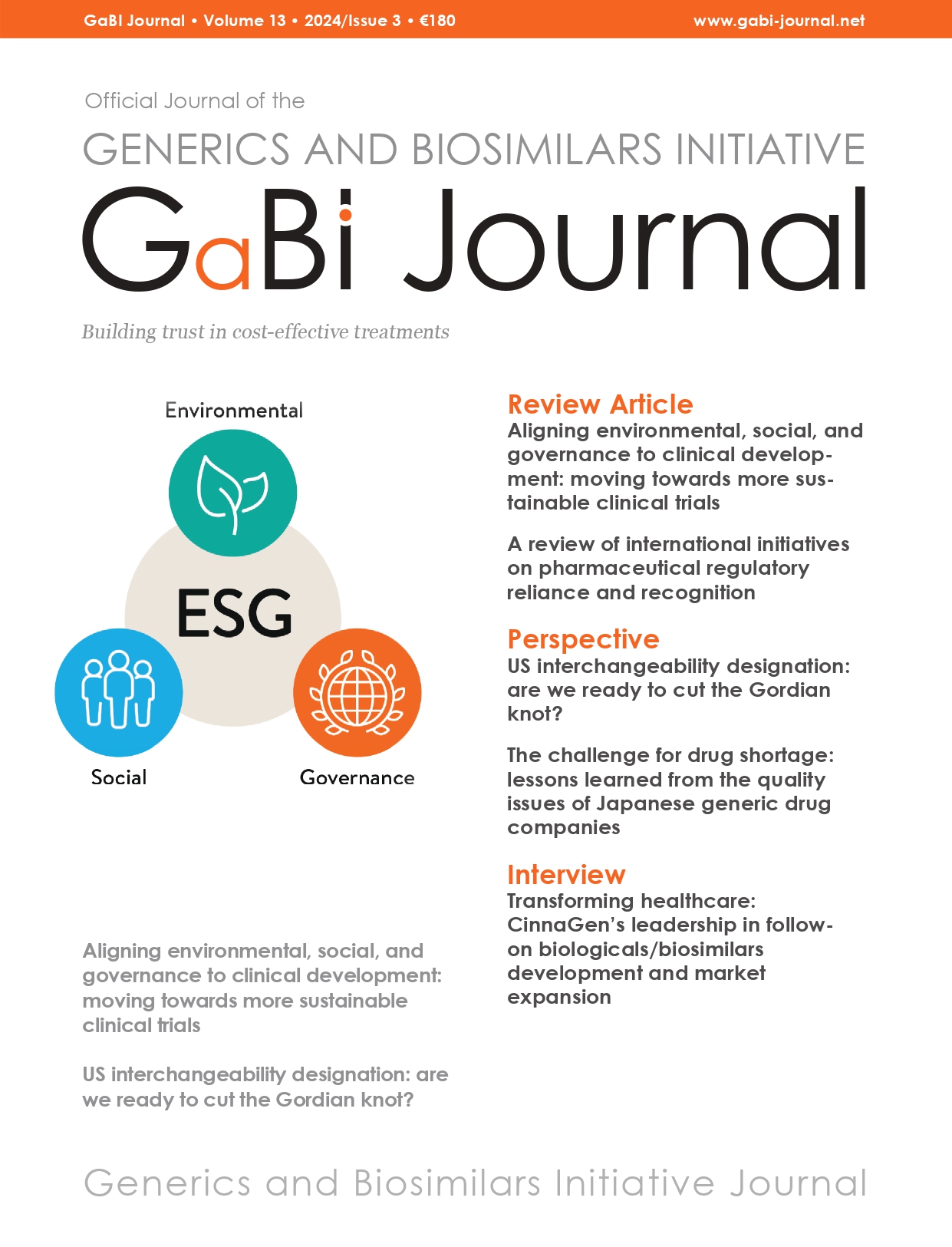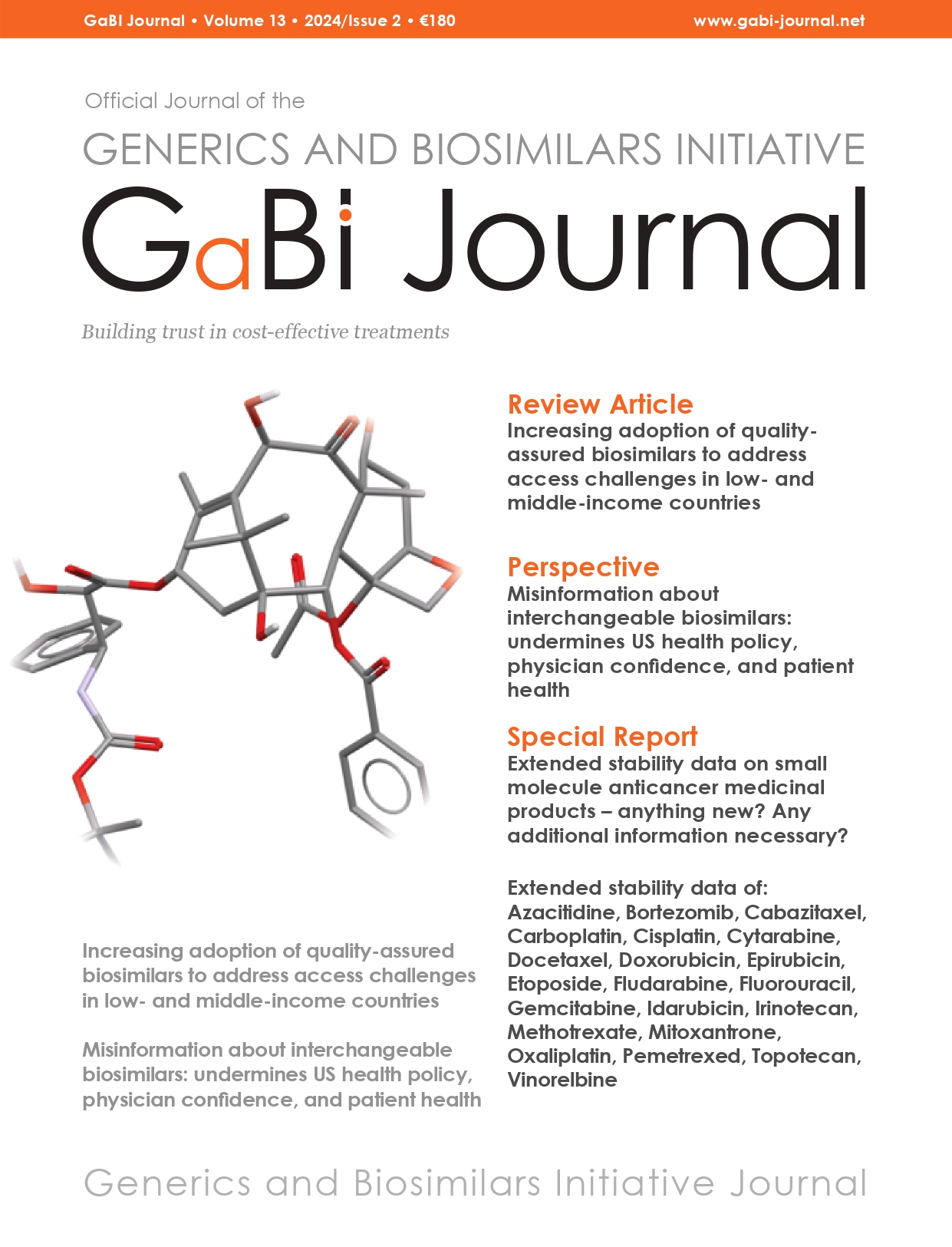Generics policies–a globally-relevant implementation challenge
Published on 2012/08/02
Generics and Biosimilars Initiative Journal (GaBI Journal). 2012;1(3-4):113-4.
|
Abstract: |
Submitted: 23 July 2012; Revised: 1 August 2012; Accepted: 1 August 2012; Published online first: 2 August 2012
In this issue of the GaBI Journal, Vogler and Zimmerman report on the Pharmaceutical Pricing and Reimbursement Information (PPRI) Conference held in Vienna, Austria, in September 2011 [1]. They have identified issues relating to generic medicines policies as having emerged as a recurring topic throughout that conference, despite not being defined beforehand as an explicit strand of the event. The critical lesson they have extracted, predominantly (but not exclusively) from evidence generated in Europe, is that generics policies have not yet been implemented to their full extent. The conference called for ‘more consistent generics policies’.
The basic building blocks of such a policy have been outlined for more than a decade in the World Health Organization’s (WHO) guideline ‘How to develop and implement a national drug policy’ 2001 [2]. The WHO document emphasised four key elements: supportive legislation; quality assurance capacity; acceptance by prescribers and the public; and economic incentives. It also noted that most countries would go through four possible stages of policy and implementation: generics substitution not allowed; generics substitution allowed; generics substitution encouraged; generics substitution obligatory. WHO warned against attempting to ‘jump from the first phase into a system of obligatory generics prescribing’. Vogler and Zimmermann’s report highlights some important examples of where poorly planned policies have failed. These include policies that fix the price difference between originator and generic products, poorly-designed reference pricing systems that entrench higher than necessary prices, and obligatory generics prescribing in the absence of other elements (notably demand-side measures).
An element that perhaps did not receive sufficient attention was that of ensuring public and professional confidence in the quality of generic products approved by national or regional medicines regulatory authorities. This may not be as much of a challenge in Europe as it is in developing and transitional countries in other regions. However, in far too many countries, it is precisely the lack of transparency about medicines registration processes that feeds both corruption and a lack of confidence in the decisions made [3]. Far too few countries provide public access to an electronic medicines register that discloses the basis for generics registration including, where appropriate, the identity of the reference product used in bioequivalence testing. This is a crucial element of a comprehensive and consistent generics policy.
There are also important issues to consider in relation to intellectual property law, such as avoiding unnecessary linkages between patent and medicines registration processes and limiting data protection provisions that may delay generics entry.
Appropriate medicines pricing policies are key to enhancing generics uptake. Examples cited by WHO included making comparative medicines price information available, reimbursement policies in insurance schemes, favourable margins for generic medicines, and tax incentives for the generics industry. The issue of reimbursement policies is of increasing importance as more countries, particularly in the developing world, attempt to introduce universal health coverage (UHC). UHC has been defined as ‘ensuring that all people have access to needed promotive, preventive, curative and rehabilitative health services, of sufficient quality to be effective, while also ensuring that the use of these services does not expose the user to financial hardship’ [4]. Such policies imply a major shift in the procurement and reimbursement policies generally followed in such countries. This challenge was recognised by the WHO-hosted Alliance for Health Policy and Systems Research, which issued a call for research proposals in May 2012, directed specifically at generating and increasing the use of policy-relevant evidence in low- and middle-income countries [5]. Specifically, the Alliance identified three research questions:
- In risk protection schemes, which innovations and policies improve equitable access to and appropriate use of quality medicines, sustainability of the scheme, and financial impact on beneficiaries?
- How do policies and other interventions into private markets impact on access to and appropriate use of quality medicines?
- How can stakeholders use information and data routinely collected and available in the system in a transparent way towards improving access to and use of quality medicines?
Fundamentally, these three questions echo the concerns expressed by Vogler and Zimmermann in relation to generics policies, but also emphasise their global relevance. Generic policies will be critical in ensuring access to affordable medicines in all settings, but poorly designed and implemented policies can hamper progress towards achieving universal health coverage.
Disclosure of financial and competing interests: In 2009, author attended continuing education events as guest speaker, to the extent of costs of travel and accommodation, use of hire care, honorarium, from Fresenius Kabi. The author has full control of the content in the manuscript.
Provenance and peer review: Commissioned; internally peer reviewed.
References
1. Vogler S, Zimmermann N. The potential of generics policies: more room for exploitation–PPRI Conference Report. Generics and Biosimilars Initiative Journal (GaBI Journal). 2012;1(3-4):146-9. doi:10.5639/gabij.2012.0103-4.030
2. World Health Organization [homepage on the Internet]. How to develop and implement a national drug policy. 2nd ed. Geneva: World Health Organization; 2001. [cited 2012 Aug 1]. Available from: http://apps.who.int/medicinedocs/en/d/Js2283e/
3. Kohler JC, Baghdadi-Sabeti G. Good governance for the pharmaceutical sector. In: The world medicines situation 2011. 3rd ed. (WHO/EMP/MIE/2011.2.5). Geneva: World Health Organization; 2011.
4. World Health Organization [homepage on the Internet]. What is universal coverage? [cited 2012 Aug 1]. Available from: http://www.who.int/entity/health_financing/universal_coverage_definition/en/index.html
5. World Health Organization [homepage on the Internet]. Alliance for health policy and systems research. Call for expressions of interest: health policy and systems research in the field of access to medicines in low- and middle-income countries. 7 May 2012 [cited 2012 Aug 1]. Available from: http://www.who.int/alliance-hpsr/alliancehpsr_atmcall_for_eoi.pdf
|
Author: Andy Gray MSc (Pharm), FPS, Senior Lecturer, Division of Pharmacology, Discipline of Pharmaceutical Sciences, School of Health Sciences; Consultant Pharmacist, Centre for the AIDS Programme of Research in South Africa (CAPRISA), University of KwaZulu-Natal, Private Bag 7 Congella 4013, South Africa |
Disclosure of Conflict of Interest Statement is available upon request.
Permission granted to reproduce for personal and non-commercial use only. All other reproduction, copy or reprinting of all or part of any ‘Content’ found on this website is strictly prohibited without the prior consent of the publisher. Contact the publisher to obtain permission before redistributing.
Related article
The potential of generics policies: more room for exploitation–PPRI Conference Report


